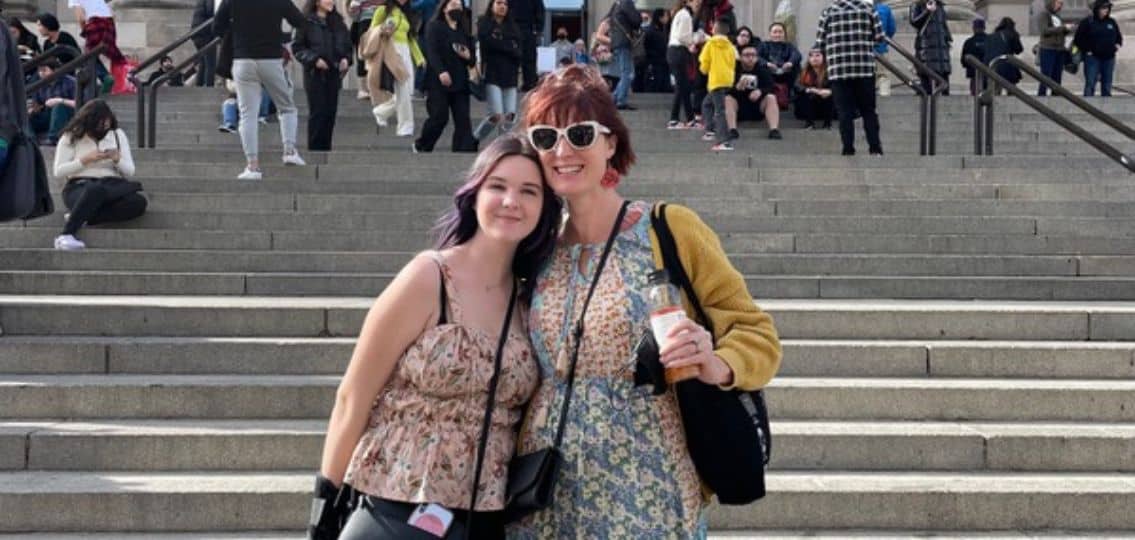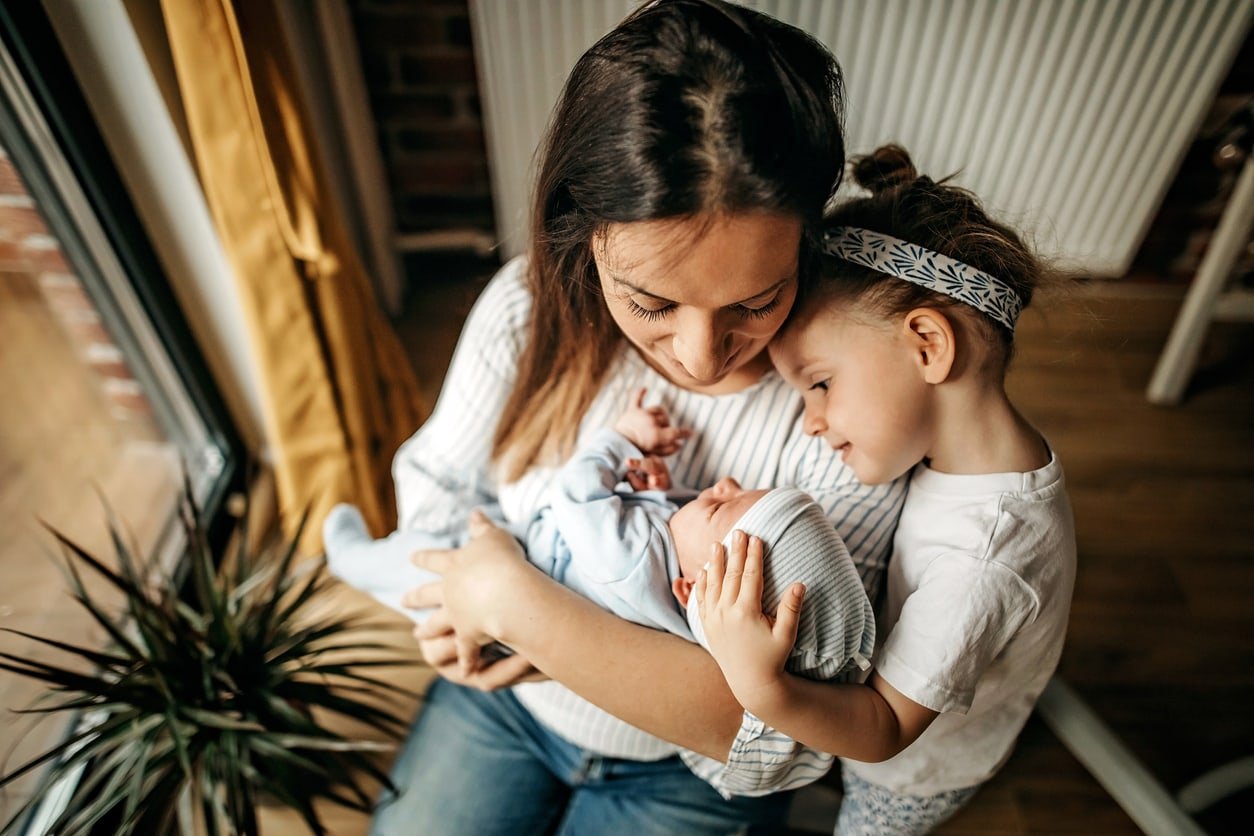
By Stephanie Sprenger
I saw them through the Starbucks window as I was walking into Target with my husband. First, the one — dancing like the entire world was her personal stage — and then the other, doubling over with laughter. It was the second one who made my stomach drop and made me say the expletive I reserve only for really, really terrible people.
My husband calmly guided me into the store by my elbow. “Just keep walking,” he said.
Meanwhile, anxiety buzzed through my body. “I have PTSD from those kids,” I muttered. “I hate them.” I darted my gaze around to make sure the girls hadn’t left the coffee shop to enter the store.
After so many months, I still marvel at that truth — that I, a 44-year-old mother, am capable of hating children. What does this say about me?
At the pharmacy counter, my husband translated my raspy whispers to the clerk, and then we waited for yet another round of antibiotics and steroids. Now on my third sinus infection and subsequent bout of laryngitis since everything fell apart last year, I felt as though grief had disabled my immune system and infiltrated my body, targeting me where I was weakest — stealing my voice, my most powerful force.
My inner commentary made my jaw clench and my heart and breath race. My daughter should have been here with those girls. Just one year ago, when we ran into these girls in this exact place, I shrieked with joy and actually kissed the top of one of their heads, a friend who had just been released from the hospital. She had missed out on trick-or-treating during her inpatient hospitalization and my daughter was going to recreate Halloween for her at our house.
Before I hated the girls, I loved them. I relished my time with them. They cried to me, hugged me, and referred to me privately as “Queen Steph,” a moniker I pretended not to be aware of. After they spent the night in our basement, four girls shrieking into the wee hours, I asked what kind of milk they wanted in their iced lattes, like I was some kind of maternal barista. Then I tiptoed away to let my daughter have her moment to shine. (You’ve heard how problematic it is to be enmeshed with your children, surely?)
My daughter lit up in their presence.
Perhaps that’s a lie.
My daughter lit up when she was on the inside of their friendship. All those videos they sent her when they were hanging out without her? I could almost see her light dim.
Maybe I was the one who lit up in their presence.
I will not tell you about the terrible things these girls said to my daughter, or about the way they pushed her out so subtly but firmly with plausible deniability. I won’t talk about how their mob mentality takes shape, how it morphs into an unstoppable, insidious monster, effortlessly sucking up weak-willed girls. I won’t describe how desperate these girls are to fit in, while boldly proclaiming their uniqueness through intricately crafted non-conformity. Why won’t I share details? Because I want to give my daughter space to tell her own story; instead, I’ll tell you mine.
I will tell you that I became a mama bear, primal in my desire to protect my child. I rebuked teenagers in public and imagined myself burning down the school auditorium as I growled, “How dare you!” heartbroken and clinging to what could have been.
This is not the way it was supposed to go for her. My daughter, not that girl, should take center stage. My daughter, not that girl, should double over with laughter. My daughter, not that girl, should lead this group of friends.
Thoughts like these paralyzed me with their hopelessness; and shamefully, I tried to shut them down because other parents have fared far worse, in terms of what was supposed to happen to their children.
Did I know what I was doing, dancing with these girls, laughing at their jokes, revealing my wildness, and never filtering out my own profanity and edge? Did I intentionally climb that pedestal, demurring when my daughter insisted they liked me better than her? I made myself beloved in a way that I never was when I was their age. In the darkest part of my heart, was there a part of me that felt proud?
When I was a teenager, sure, I had friends, and always a boyfriend, but people never exclaimed with delight when they saw me coming. They didn’t compliment my style and laugh at my jokes and gravitate wordlessly toward me. I was never the sun around which my friends orbited. No, I stayed small, the way good Lutheran girls from the Midwest were supposed to. I never spoke too loudly or tried too hard, so I could blend in and go unnoticed. Back then, I was an asteroid wobbly orbiting around someone else’s sun.
But now, decades later, for a brief pocket of time, I became the cool mom. I was seen, beloved, and revered by my daughter’s friends. When she lost them, I lost them. They hurt her, and they betrayed me, too.
Now they brand me a “witch,” and this label I’ve earned. Always ready to battle the mob, I call them out and make them uncomfortable. I guide my sobbing child through crowds with murder in my eyes.
Out of loyalty to my child and rage at the parents of those other girls, I resign from a parent leadership position. I quickly delete emails informing me that tickets are now on sale. Never again will I set foot in that auditorium to watch my child or any other perform. Not after all this.
My daughter heals from this painful friendship breakup slowly, so very slowly, while I burrow and grieve, and rage. I have nightmares about these girls. In one, my feet don’t move when I encounter the worst one and her mother at the ice cream shop. In other dreams, I confront them. Occasionally, I’m graced with a fictional conversation where there is accountability and understanding, a reality suitable only for dreams. Then, too, there are also nightmares where my own friends tell me that I’m the one being unreasonable and that I have no right to my anger. I shout back, “You have no right to gaslight me!”
During sleep and wake and therapy — so much therapy — I unpack my unconscious role in it all. Was the breakup my fault? Did I ever have enough power to cause all this pain?
Half a year passes and my daughter makes a new friend, who becomes a best friend. I’m joyful and welcoming, but rein myself in. Life turns sour when I give too much of myself to my daughter’s friends. At night, I dream the new friend’s mom turns a large crowd of people against me, and when I wake up I’m flooded with relief and simultaneous shame.
Eventually, I acknowledge that my quest for justice, my obsession with dichotomies of right and wrong, is keeping me stuck in bitterness and that there is no bypassing grief with rage.
My daughter’s childhood is not the way I wanted. It’s not what I imagined. It’s not what she deserves. When my daughter’s friends turned against her, they stripped away the cool mom identity I built despite my efforts to keep it. My experience of loss is real, and it’s why I’m grieving. There is no way around it. This is the path through my grief I must travel, even as my daughter walks her own path through the grief that’s hers.

 PARENTING TIPS
PARENTING TIPS PREGNANCY
PREGNANCY BABY CARE
BABY CARE TODDLERS
TODDLERS TEENS
TEENS HEALTH CARE
HEALTH CARE ACTIVITIES & CRAFTS
ACTIVITIES & CRAFTS

